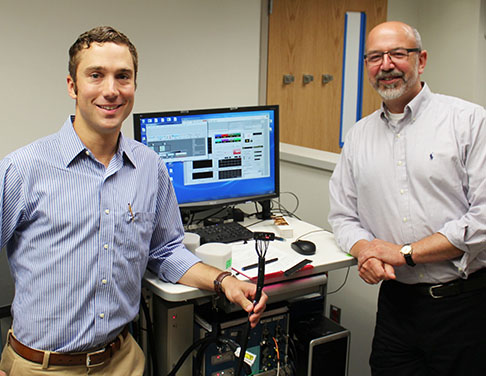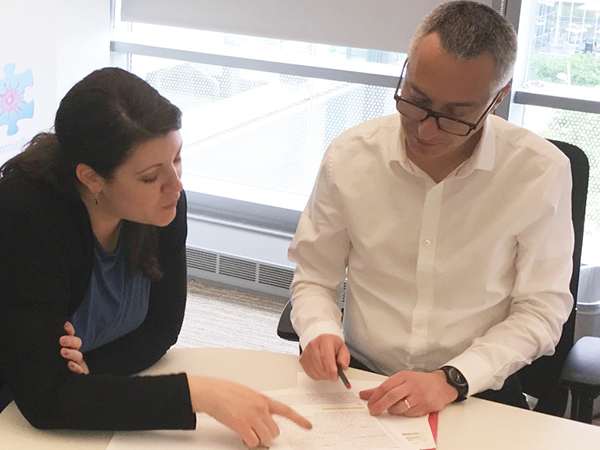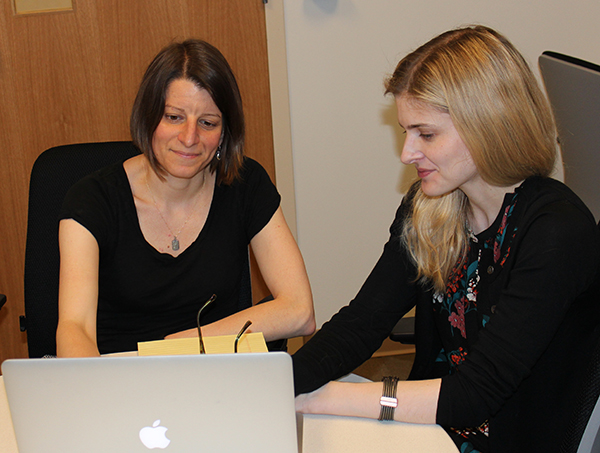HOW CAN WE HELP YOU? Call 1-800-TRY-CHOP
In This Section
Meet the CHOP Mentors Changing Research Trainees' Lives
 Our research trainees at Children’s Hospital of Philadelphia go on to treat, teach, and investigate at some of the best medical institutions in the world. As the next generation of pediatric scientists, the mentors they meet while at CHOP don’t just influence their careers, but the future of children’s health, too. The Research Trainee Advisory Committee named this year’s Award for Excellence in Mentoring Research Trainee winners as Daniel Licht, MD, pediatric neurologist; Matthew Weitzman, PhD, associate professor of Pathology; and Joanne Wood, MD, attending physician and research director of Safe Space: the Center for Child Protection and Health at CHOP.
Our research trainees at Children’s Hospital of Philadelphia go on to treat, teach, and investigate at some of the best medical institutions in the world. As the next generation of pediatric scientists, the mentors they meet while at CHOP don’t just influence their careers, but the future of children’s health, too. The Research Trainee Advisory Committee named this year’s Award for Excellence in Mentoring Research Trainee winners as Daniel Licht, MD, pediatric neurologist; Matthew Weitzman, PhD, associate professor of Pathology; and Joanne Wood, MD, attending physician and research director of Safe Space: the Center for Child Protection and Health at CHOP.
The Award for Excellence in Mentoring Research Trainees recognizes faculty members who effectively guide the training and professional development of postdocs and research fellows. The Committee introduced the honor last year, with each selection based on a batch of nominations submitted by current and former research trainees. This year’s winners exemplify a unique mentoring style, an established history of guidance, and an influence that goes above and beyond just helping their mentee pick a research project.
Daniel Licht, MD: An ‘Academic Chameleon’
Dr. Licht defies any simple definition, according to his current and former trainees. Though he joined CHOP as a neurology researcher focused on infants with congenital heart defects, Dr. Licht’s interests and impact extend much further than the world of neurons and brain networks. Constantine Mavroudis, MD, a post-doctoral researcher at CHOP who nominated Dr. Licht, described his mentor as an “academic chameleon” who enthusiastically experimented across different disciplines and approaches in science, thanks to interests that span from optical physics, to cardiac surgical methods, to neurological imaging methods, and more.
 Constantine Mavroudis, MD (left) and Daniel Licht, MD (right)
Constantine Mavroudis, MD (left) and Daniel Licht, MD (right)
“From professors of physics, to medical students pursuing a career in pediatric anesthesia, to postdoctoral fellows and graduate students in physics, and my own background as a cardiothoracic surgical fellow, his mentorship range is equally expansive as his clinical and research range,” wrote Dr. Mavroudis in his nomination letter.
An open mind in the truest sense of the word, it’s no wonder that Dr. Constantine describes Dr. Licht as, “everything to everyone.”
Another one of Dr. Licht’s former trainees, Turgut Durduran, PhD, professor at the Institute of Photonic Sciences in Barcelona, described how as a young physicist at Penn, he approached Dr. Daniel Licht, MD to see if the neurologist might be interested in using his new optical technique, diffuse correlation spectroscopy, for neonatal research. Dr. Licht welcomed the collaboration with enthusiasm and eventually encouraged Dr. Durduran to apply for a pediatric research program that led to Dr. Durduran’s first grant, which was focused on neonates.
“Our collaboration with Dan and his patient supervision to train me in becoming an expert in the clinical translation of this new technology have triggered this series of events that allowed me to progress in the ranks of academia,” wrote Dr. Durduran in his nomination letter.
Dr. Licht shared his own enthusiasm as a mentor: “I have been ridiculously fortunate to have all these wonderful people find their way to my lab,” he said. “I don’t really know how it’s all happened, but there has been almost a parade of really bright, inquisitive and hard-working students and fellows.”
Matthew Weitzman, PhD: A Lab ‘Built on Comradery’
Picture the most colorful, collaborative, and interactive research space you can imagine. It most likely resembles the laboratory of Dr. Matthew D. Weitzman, PhD, according to descriptions offered by the virologist’s former and current research trainees. Along with his many contributions to the field of microbiology, Dr. Weitzman’s influence is indeed a “viral” force in the best sense of the word.
 Daphne Avgousti (left) and Matthew Weitzman, PhD (right)
Daphne Avgousti (left) and Matthew Weitzman, PhD (right)
Daphne Avgousti, a postdoctoral fellow at CHOP who nominated Dr. Weitzman, describes his mentoring style as one that encourages a supportive and synergistic spirit. In the first week of her postdoc, Dr. Weitzman sent Avgousti to a conference to learn more about chromatin control of viral infection — the subject that would lead Avgousti to conduct collaborations across the campus and field and, eventually, an exciting discovery published in Nature.
“When the email came through, we all cheered in the lab because [Matt] deserves to be recognized for his efforts in mentoring,” Avgousti said. “Matt serves as a mentor not just for everyone in our lab, but to several others on campus and in our field who seek advice.”
According to another former trainee, Seema Lakdawala, PhD,, assistant professor in the department of Microbiology at the University of Pittsburgh, the Weitzman lab is “built on comradery” ... and a little bit of fun. “I remember the first lab retreat Matt organized; it started with a scavenger hunt and ended with science discussions over margaritas,” wrote Dr. Lakdawala in her nomination letter. “We also designed lab shirts every year, which is a tradition I have maintained in my laboratory.”
Dr. Weitzman called the Award a tremendous honor: “I have been very fortunate to attract a great group of enthusiastic and dedicated young scientists and clinicians to my lab,” he said. “It has been a lot of fun to bring them together to form a collaborative group and watch them flourish. One of the most rewarding parts of my job is to engage and inspire trainees. We have formed a very interactive group, where everyone contributes to making new discoveries. Helping trainees grow scientifically and personally has been very fulfilling for me.”
Joanne Wood, MD: The ‘Epitome of a Perfect Mentor’
Dr. Joanne N. Wood, MD’s warmth as a mentor shines through in the words and anecdotes of those who nominated her. Alongside caring for vulnerable populations and researching new ways to improve the quality of that care, the avid clinician-researcher has served as a mentor for 13 trainees over the last nine years. Many of these trainees share stories in nomination letters that highlight Dr. Wood’s kindness just as much as her dedicated guidance.
 Joanne Wood, MD (left) and Kate Henry, MD (right)
Joanne Wood, MD (left) and Kate Henry, MD (right)
Kate Henry, MD, a fellow in the department of Child Abuse Pediatrics at CHOP, described one experience at the 2015 Helfer Society meeting in which Dr. Wood immediately recognized Dr. Henry’s enthusiasm for the speakers and proceeded to introduce her to child abuse experts and investigators with similar passions. Dr. Wood inspired Dr. Henry to pursue a child abuse fellowship.
Another former trainee, Hiu-fai Fong, MD, a staff physician at Boston Children’s Hospital, described an instance where Dr. Wood offered her “words of wisdom” in regards to submitting manuscripts and accepting the inevitability of rejection. Dr. Fong wrote in her nomination letter that “she encouraged me to have faith in the quality of my research, the importance of the findings, and my abilities as a researcher. Moments like these illustrate how incredibly empathic and supportive she is.”
Dr. Wood credits her enthusiasm for mentoring to her own experience as a trainee: “During the past 15 years I have benefitted from the generosity of talented mentors who have selflessly shared their time, knowledge, and experiences with me,” she said. “The incredible mentorship provided by senior faculty members is the reason I chose to come to CHOP for my training 15 years ago and the reason I have never left. Now as a junior faculty member I have the privilege and pleasure of working with talented trainees. I try to share some of what I learned from my mentors with my mentees. I am incredibly touched and humbled by this recognition.”